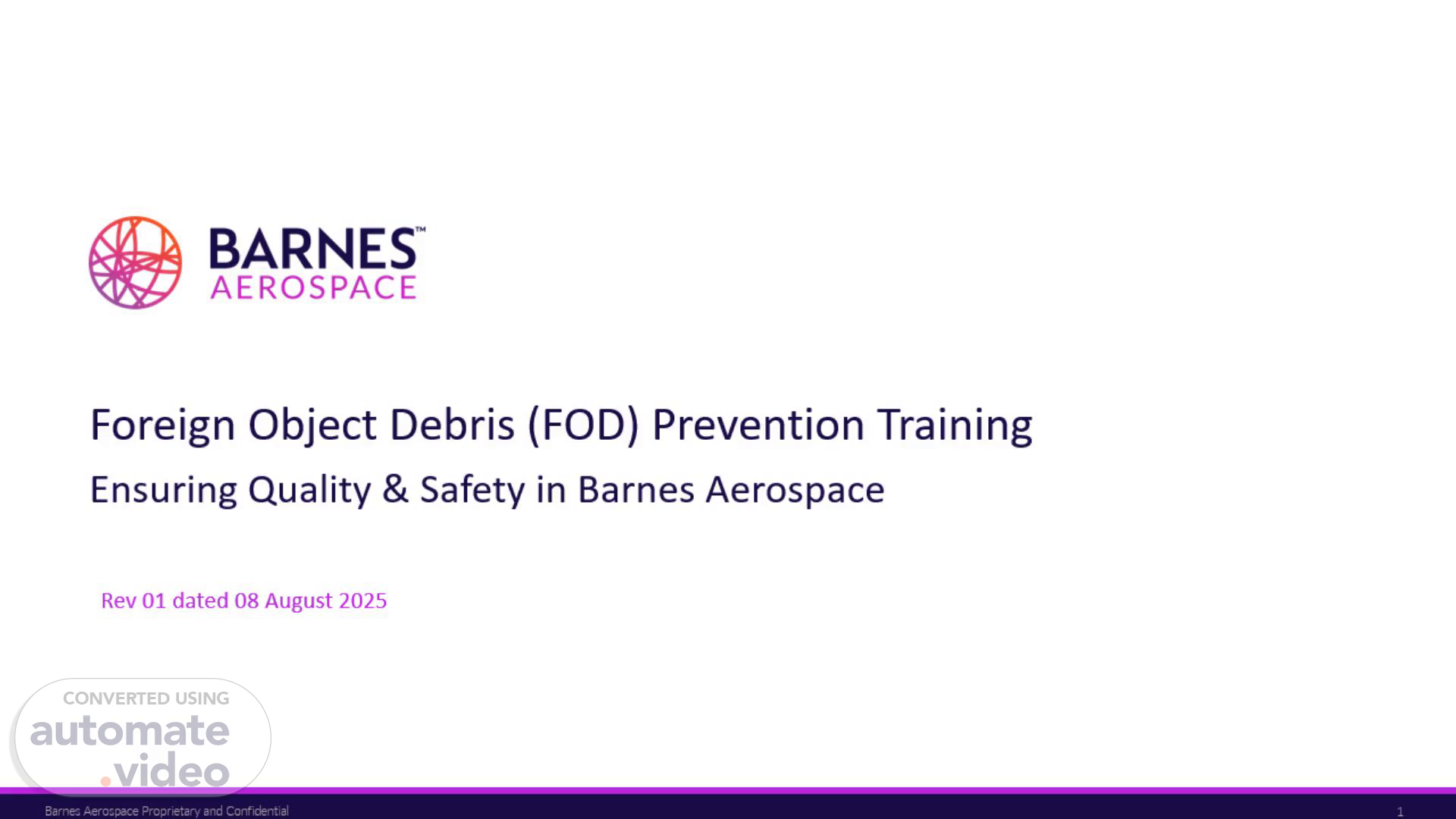Scene 1 (0s)
[Audio] Welcome to the Foreign Object Debris Prevention Training for Barnes Aerospace. In this session, we'll learn how to identify, prevent, and report FOD to ensure quality, safety, and compliance in all our operations. Remember — every team member plays a critical role in maintaining a FOD-free environment..
Scene 2 (20s)
[Audio] By the end of this training, you'll be able to: First, understand what FOD is and why it's so critical in aerospace maintenance and repair operations. Second, identify common sources of FOD in our work environment. Third, apply practical methods to prevent and detect FOD in your daily tasks. And finally, follow proper reporting procedures to support continuous improvement and uphold our safety standards..
Scene 3 (48s)
[Audio] Let's start with the basics — what is FOD? Foreign Object Debris refers to any object, substance, or material that doesn't belong in or near an aircraft or component, and could potentially cause damage. Examples include forgotten tools, loose screws, safety wire clippings, rags, or even personal items like pens and jewelry. In aerospace, FOD not only means the debris itself, but also the damage that debris can cause to aircraft systems or components..
Scene 4 (1m 22s)
[Audio] FOD has serious consequences — for safety, cost, and reputation. Safety-wise, FOD can lead to equipment malfunctions, control surface restrictions, or even catastrophic failures during flight. Financially, the global aerospace industry spends around 4 billion dollars a year on FOD-related incidents, including repairs and rework. Beyond that, FOD incidents damage company reputation and can lead to non-compliance with authorities like the FAA and EASA. Preventing FOD is not just good practice — it's a necessity for safety, reliability, and trust..
Scene 5 (2m 5s)
[Audio] FOD can occur anywhere — but certain areas are especially high risk. Workbenches, tooling zones, and inside components during servicing are common spots. Packaging and storage locations, as well as final inspection stations, also require extra attention. Critical processes like cleaning and assembly should always be carried out with strict FOD awareness. Being alert in these areas helps prevent foreign objects from entering critical components..
Scene 6 (2m 36s)
[Audio] In maintenance and repair shops, FOD often comes from five main sources. First, shop tools — missing sockets, broken tool bits, or tools left behind. Second, hardware like loose fasteners, washers, or cut-off wire ends. Third, manufacturing debris such as metal shavings, grinding dust, or leftover sealant. Fourth, personal items — jewellery, pens, or electronic devices that don't belong in the work area. And finally, packaging materials — plastic wrap, tape, or foam that can easily go unnoticed. Awareness of these sources is the first step in prevention..
Scene 7 (3m 18s)
[Audio] Preventing FOD starts with discipline and good housekeeping. Always practice tool control — use shadow boards, check tools in and out, and perform regular audits. Follow the clean-as-you-go principle — clear debris immediately and dispose of it in designated FOD bins. Conduct workstation inspections before starting work, during critical steps, and after completion. And remember access control — only authorized personnel should enter work areas, and all visitors should receive a FOD awareness briefing. Consistent habits make a big difference in preventing foreign object contamination..
Scene 8 (3m 58s)
[Audio] Finally, let's talk about reporting. Every FOD incident or near miss must be documented using form QA047 and submitted to the Quality Department within 24 hours. Each case is investigated to determine the root cause and prevent recurrence. Corrective actions — both short-term and long-term — are then implemented, and procedures updated when needed. The Quality team also performs trend analysis every quarter to identify recurring patterns and share lessons learned. Remember — reporting FOD is not about blame. It's about improving safety, learning from mistakes, and ensuring a culture of accountability. Every one of us is responsible for keeping our work areas clean, safe, and FOD-free..
